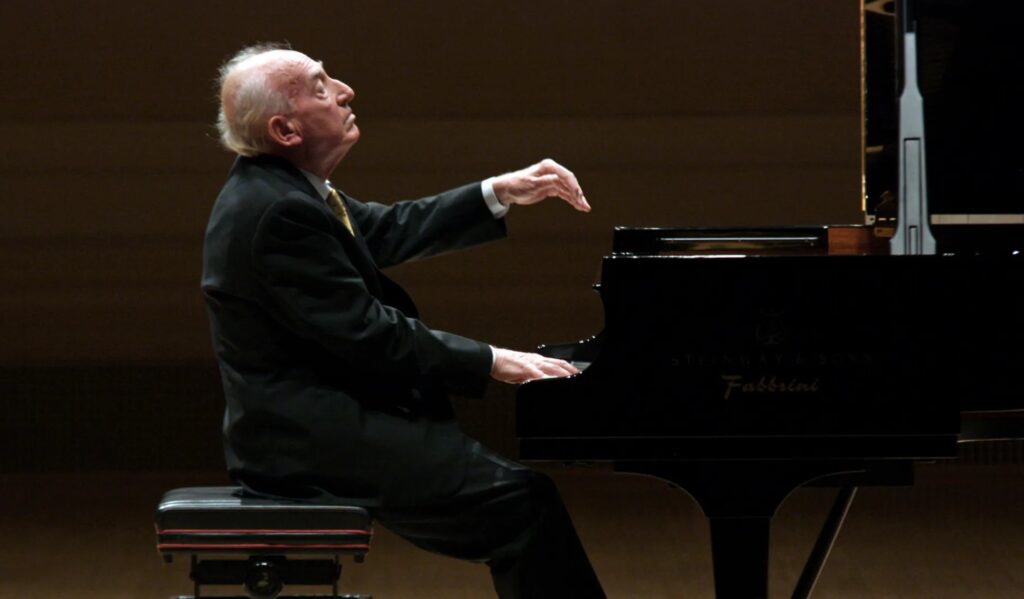Remembering the Great Maurizio Pollini
Legendary pianist Maurizio Pollini defined modern piano playing through a combination of virtuosity of the highest degree, a complete sense of musical purpose and commitment that works in complete control of the virtuosity. His passing was announced by Milan’s La Scala opera house on March 23.

Between the 1970s and 90s, he launched various recordings with the Deutsche Grammophon label, solidifying his reputation as an esteemed interpreter of works by Beethoven, Schumann, Schubert, and Brahms. He later incorporated contemporary works by Boulez and Nono, developing close relationships with both composers. Pollini’s albums earned numerous awards, including a Grammy in 2007 for his Chopin: Nocturnes solo performance.
One of the last recording from Maurizio Pollini features Beethoven’s final three piano sonatas, works he first recorded more than four decades ago. “The sonatas were published separately,” notes Pollini, “but can be seen as forming a unified cycle.” In the Sonata in E major op. 109, completed in September 1820, the first two movements – played without a break – function almost as an introduction to the much longer finale. Here he plays the first movement live in Munich’s Herkulessaal on September 27, 2019.
Maurizio Pollini, De main de maître – A musical profile of the famous pianist
From Claudio Abbado to Pierre Boulez, from Bach to Verdi to Schoenberg, Nono and Stockhausen: A musical profile of the important milestones in his career, the musicians he has known and his varied repertoire. Based on an extended interview, the film also includes archival footage and excerpts from concerts and documentaries.
There were several compelling reasons to make a film portrait of Maurizio Pollini: his immense talent as a pianist, his rare personality, his affability, intelligence and the desire he himself expressed to submit to this exercise for the very first time — probably because at the age of over 70, he felt that it was time to consent to a film portrait.
Directed by Bruno Monsaingeon, 2014.
Reader question: Which is your favourite Pollini recording?
Please post your reply in the comment form below!
Read more:
Pollini at 70 Returns to Dresden with Brahms
Maurizio Pollini’s Chopin Etudes Astonish 50 Years Later
The Pollini Project – charting the development of piano music from Bach to Boulez
The Guardian: Maurizio Pollini obituary
Gramophone: The pianist Maurizio Pollini has died at the age of 82
Comments
RIP Maurizio. The best recording I know of is Prokofiev’s Sonata 7. The album is recorded 1972 and also contains Stravinsky’s Petrouchka.
I love the Chopin 24 Preludes DG album from the 70s. Very poetic playing.
A lot of his Chopin recordings are great.
Not so much the Beethoven.
I have every recording he ever made…
3 Movements from Petrushka
I consider all his recorded works to be masterpieces. I was fortunate to have seen him in concert as well. He will be greatly missed and so will his social activism on behalf of the downtrodden and his ability to combine both his art and his causes.
The Schumann Fantasy coupled with the first piano sonata, DG 1973. The aria is played as beautifully as it can possibly be played. Almost everything he recorded in the 1970s and 80s was great (shame about DG’s often bony engineering).
Mozart’s Piano Concerto 23, which I’d always enjoyed but Pollini truly brought it to my conscious & enchanted attention! Grazie, Maurizio, per tutto! R.I.P. in the knowledge that you will be remembered & beloved.
Pollini’s Chopin recordings were a major inspiration to my wanting to play piano as a child. In recent times I have come to appreciate how truly unique he was through live recordings which shed a different light on his art then the limits of the studio. Probably nobody would deny the titanic achievement of his studio Petrushka as a technical marvel. For me it is especially the concert recordings of Beethoven’s op. 106 and last three sonata which stretched throughout his career, and likewise the Boulez 2nd Sonata, complete piano music of Schoenberg, Berg, and Webern, and music by Nono and Stockhausen. He obviously was convinced of the worth of this music and had a way of communicating it to audiences throughout his career. His skillfully embedding the contemporary with the war horses of Mozart, Beethoven, Schubert, Chopin, Schumann, Brahms, and Debussy further contributed to these communicative abilities. Such an artist should live forever – alas, we are all going that way. I’m thankful for his huge recorded legacy.
I remember him as he won the first price on Chopin’s Piano Competition organised every 5 years in Warsaw. I think it was 1955 and Maurizio was 17 or 18 y.o. The deep understanding of difficult Chopin’s music was amazing. Everybody loved him during this competition, such a young, fragile boy, playing with incredible emotional power…
The recording of Schumann’s first sonata and the Chopin etudes op.10 and 25. Milestones in the history of recording.